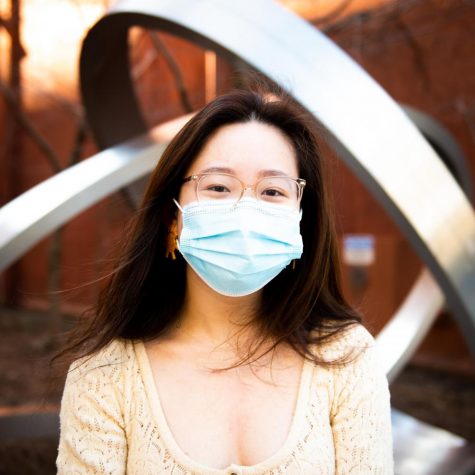I was born in New York City. I grew up in Richmond. I reveled in my American history and government classes. I even voluntarily participated in a year-long civics competition where I obsessively memorized the Constitution. Being an American is all I’ve ever known.
In light of the surge of xenophobia and hatred directed toward East Asians, it’s been difficult for me to grapple with the reality that despite how American I may feel, that identity can be easily revoked in times of crisis. I’m wrapped up in a monolith Asian stereotype where my ethnicity comes before anything else. I’ve heard countless racist jokes about me infecting others with the coronavirus. I’ve had wary shoppers shooting accusatory glances in my direction at the grocery store.
I know, though, that discriminatory jokes and distrustful glances are only the tip of the racist iceberg, and I’m extremely lucky to have only endured this much. I’ve heard other testimonies from Asian students being called “diseased b-tch” for wearing a mask and other Asian students being prompted “shouldn’t you be wearing a mask?” by strangers on the street for not wearing one.
And influential figures have repeatedly failed to put out these xenophobic flames. Carriers of the coronavirus aren’t confined to just Asian people. Yet, media outlets have repeatedly put the face of Asians at the front of their coronavirus articles. When New York confirmed its first case of coronavirus, the New York Times, Forbes and the New York Post reported this story using photos of unrelated Asian people wearing face masks. A reporter at the White House’s pandemic task force press briefing cited an anonymous report that a White House official used the term “Kung Flu.” Notably, President Donald Trump continually insists on calling the coronavirus the “Chinese Virus.”
But this behavior isn’t new. Novel diseases have often led to a rise of fear-mongering and xenophobic hysteria. In medieval Europe, people believed the bubonic plague originated from the Jewish community. Consequently, thousands of Jews were burned at the stake and their communities massacred as their inhabitants were accused of spreading contagion and poisoning wells. When the 1853 yellow fever ravaged the United States, European immigrants faced the brunt of stigmatization. In the 1980s, HIV became associated with Haitians, partly because of a recent influx of “boat people” and the subsequent controversy of legal status in the United States. Naming diseases after foreign nations is the most common manifestation of a time period’s increased racism. The bubonic plague was called the Jewish Death. Yellow fever was nicknamed the Stranger’s Disease. HIV was dubbed the 4-H disease, a reference to the “high-risk groups” of Haitians, homosexuals, hemophiliacs and heroin users.
With this history in mind, it may be more clear why using the racist term “Chinese Virus” is inappropriate. Using the term may be a way for people to combat the perceived political correctness of avoiding naming diseases after the geographic origin of the virus. As Saagar Enjeti, the co-host of the Hill’s Rising web series, put it, “Chinese virus is the new radical Islamic terrorism.” The State Department defended Mike Pompeo’s use of the term as a way to counter Chinese Communist Party propaganda. It’s important to note, though, the World Health Organization urges people not to name diseases after geographic locations, other cultural references or terms that incite undue fear. The desire to change the label from coronavirus to yet another “foreign virus” is, just as it has been in the past, an aggressive and politically charged move that needlessly stigmatizes a group of people and heightens more fear against Chinese people.
As a result, Asians are facing a new wave of xenophobia and hate crimes. Coronavirus has proven to be economically devastating for Chinatowns and other Chinese-owned businesses as wary shoppers now avoid those areas. London student Jonathan Mok was brutally assaulted by four assailants, one of whom had said “I don’t want your coronavirus in my country” while beating him. A woman wearing a face mask was assaulted and called “diseased b-tch” on a New York City subway. One young woman was punched in the face as the perpetrator screamed, “Where’s your coronavirus mask, you Asian b-tch?” Just hours later, an Asian man was jumped as his assailants yelled, “F-ck you, Chinese coronavirus.”
These are undoubtedly trying times. Amid colleges across the U.S. closing and people urged to practice social distancing with seemingly no end in sight, it’s understandable that people are anxious about the coming days. But that is no excuse for people to hold the bigoted notion that Asian people are to be blamed, feared or hated for the coronavirus. As hate crimes against Asians surge and as my own government legitimizes this hatred by perpetuating the otherness of the “Chinese Virus,” I’ve felt ostracized by my own country. No matter how much I may identify with my own nation, it seems that my Chinese ethnicity will always put me an arm’s length away from being an American.
Opinions expressed on the editorial pages are not necessarily those of WSN, and our publication of opinions is not an endorsement of them.
A version of this article appeared in the Monday, Mar. 23, 2020 print edition. Email Emily Dai at [email protected].

























































































































































Madame Difarge • Mar 24, 2020 at 9:24 am
se to 234, two deaths
28 minutes ago ‘Advisory’: India prescribes Trump-touted drug to…
Washington Examiner Subscription Ad
The Washington Examiner
Member Log In | Subscribe Now
Tuesday, March 24, 2020
Politics
Policy
News
Opinion
Business
MAGAZINE
Multimedia
Beltway Confidential
Washington Secrets
Newsletters
OPINION
Coronavirus came from China; that’s not racism, it’s a fact
by Steven Cheung
| March 24, 2020 12:00 AM
Print this article
00:13
02:15
Sign up for In Our Opinion commentary
Email Address
“Chinese Wuhan Coronavirus.” That phrase, when uttered, does not make you a racist or xenophobe. It Als your statement fact-based.
Many American media journalists and Democratic elected officials have unwittingly become top tier surrogates of the Chinese Communist Party’s propaganda machine recently. They follow party officials in feigning outrage at those who use language that accurately describes where the virus first exploded onto the global scene.
As more facts are revealed about China’s attempts to cover up the true threat of the virus, Chinese government officials have used the red herring of racism to deflect blame away from themselves. They have also spread conspiracy theories and unfounded claims used to sow doubt about where the virus first emerged and shift blame onto the Trump Administration and the American people.
News conglomerates like CNN, MSNBC, NBC News, CBS News, the Washington Post, the New York Times, and others have outrageously parroted the Chinese government’s faux outrage, co-opting their claim that using “Chinese” or “Wuhan” to describe the origin of the virus’ outbreak is racist.
Recommended For You
Pro-lifers owe a debt of gratitude to Dan Lipinski
Elected officials like New York City Mayor Bill de Blasio, Rep. Grace Meng, and Rep. Ted Lieu have also used this tragedy to exploit fear and uncertainty by levying these same ridiculous charges of racism in order to score political cheap shots.
Of course, despite all the media figures and Democrat officials bizarrely claiming otherwise, they know full well that viruses are routinely named after their place of origin. Examples of this include Zika, Ebola, West Nile Virus, the Spanish Flu and countless others.
And indeed, the same media outlets often had no problem initially using “Chinese virus” or “Wuhan virus” in their headlines, stories, and news copy. As it became increasingly clear the Chinese government had actually intensified the outbreak and put lives in danger, Chinese officials began objecting to these phrases so as to deflect from their own culpability. Unsurprisingly, American media outlets bowed to Chinese pressure and made editorial decisions to frame the Chinese government as a victim.
Coronavirus has infected more than 81,000 individuals in China and has resulted in over 3,200 deaths — more than in any other country — yet the Chinese government has sought to shift the blame to the United States. The sheer magnitude of their ineptitude has given rise to incredulous statements and claims by both Chinese government officials and medical officials, either placing blame on the United States military or resorting to outrageously calling all of America racist for simply telling the truth.
To be clear, the United States military is not responsible for unleashing this terrible virus upon the world. That distinction belongs to the China and its leaders. When a prominent Chinese doctor sought to sound the alarm on the virus and disclose information on public online forums, he was arrested, threatened, and punished shortly before dying from the infection. More recently, China has expelled United States journalists courageously trying to report on China’s role in the global pandemic.
This makes the racism charge by their American-based colleagues even more confounding. There are U.S. journalists in China bravely resisting increasing Chinese pressure, yet reporters safe and free stateside are mindlessly regurgitating Chinese Communist Party propaganda, apparently as an excuse to label President Trump and his supporters as racists.
Meanwhile, the ban on travel from China, which the media also disparaged at the time as racist, has proven prescient. Lives were saved and it helped slow the spread of the virus. Trump and his Administration have continued to make the correct judgement calls — from declaring a national emergency to developing important private-public partnerships—to meet the needs of the American people.
The pandemic will require a comprehensive approach from the federal government, state and local authorities, medical providers, and the American people. The media and elected officials can make their job much easier if they would only stop parroting Chinese propaganda that seeks to foment unrest and erode our ability to meet this challenge.
Actual racism exists in the United States and around the world. But smearing someone as a racist or xenophobe for simply telling the truth about the Chinese Wuhan Coronavirus simply cheapend and diminishes the battle against that actual racism and xenophobia.
Steven Cheung is the founder of Solgence LLC and previously served as special assistant to the president and director of strategic response at the White House and on the Donald J. Trump presidential campaign in 2016.